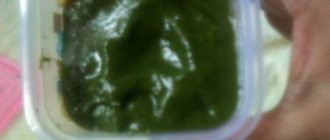Changes in physiology
At this stage of development, teeth eruption and growth continue. It is impossible to say exactly how many there should be, because much depends on the individual characteristics of the organism. Some girls do not yet have a single tooth, while others seem to have more than two. You can offer your baby cookies or a soft apple; this activity will promote further teething of the incisors and will certainly please the child.
Due to an increase in physical activity, the rate of growth and weight gain slows down somewhat. This is quite normal and should not frighten parents. At 8 months the muscle corset is strengthened. Girls can sit well, roll over, crawl, stand, walk with a walker or lean on something.
At this age, stool is formed. The feces become thicker and acquire a mild odor. Defecation is usually observed once a day. If the baby is bottle-fed and actively receives complementary foods, problems with stool may appear. In this case, bowel movements are observed once every 3-4 days. To solve this problem, you should contact your pediatrician or nutritionist to review your diet.
Proper nutrition
In the eighth month of a child’s development, food becomes more varied, although you need to feed the baby with the same caution, because many foods are new to him.
Children are fed up to five times a day, observing pauses of three and a half, four hours. The volume that the baby needs is determined individually, so that the baby does not overeat. This can also harm him. To calculate how much a baby needs to eat, his weight is divided by 9. Although calculations may not be necessary.
The average child eats up to 1200 ml per day, and dividing this amount by the number of meals, the baby needs to eat 200-240 ml per meal.
If the baby is breastfed, he will need his mother 2-3 times a day. But the volume of milk is small. Basically, the baby is already actively consuming complementary foods. For example, eight-month-old babies can already eat:
- light porridge;
- not very fatty cottage cheese;
- special yogurt for children;
- kefir;
- vegetable purees, to which spinach, parsley, and onions are added;
- pureed vegetable soups;
- meat purees, as well as purees from offal such as liver and tongue;
- boiled fish;
- for dessert you can give fruit purees or peeled apples;
- some bread;
- Children can drink fruit juices and herbal teas for children.
Children can be given cookies in their pure form or soaked in kefir/yogurt. In this case, pediatricians advise:
- To make it easier for your baby to adapt to food, it is advisable to feed him hard cookies or crackers. The child will suck it, chew it, hardening the gums and helping teeth erupt.
- You need to feed the child at the table, giving him a spoon. He will eat with the help of an adult, but at the same time the skill of self-service will be preserved.
- Before sitting down to eat, be sure to wash your baby’s hands. He can “help” his parents feed him or play with food, but because of his dirty hands he will get some kind of infection. In addition, the concept of hygiene rules will be formed.
You need to carefully monitor how the child tolerates bait, what foods he likes, and which cause him problems with digestion.
Physical standards at 8 months
An eight-month-old baby gains approximately 500 grams per month and grows by about 1-2 cm. Let us remember that everything here is purely individual and depends on factors such as nutrition, lifestyle, genetics and others.
Despite this, doctors use average values to determine normal rates of development. If strong deviations from them are observed, the toddler should be sent for additional examination, which will help to find out the causes of such violations. Accurate table of indicators for girls at 8 months.
| Options | Normal values for girls at 8 months |
| Weight | 6-10 kg |
| Height | 63-74 cm |
| Head circumference | 40-46 cm |
| Chest circumference | 44-49 cm |
If your daughter’s indicators differ slightly from generally accepted norms, do not worry. Let us remember that the rate of growth and weight gain is often of a purely individual nature. You should sound the alarm and consult a doctor only in cases where your child’s indicators deviate greatly from the norm.
What can a girl do at this age?
A toddler at this age does not sit still for a second. The baby crawls, tries to walk, overcomes obstacles in the form of pillows, and enjoys playing in a walker or playpen. In other words, the little fidget is in constant motion.
Let's find out what an eight-month-old girl can do:
- The girl devotes a lot of time to studying toys and surrounding objects. She rolls balls, presses various buttons, and transfers objects from one hand to the other. Many people really like to play with books and magazines. The rustling pages create real delight.
- The baby babbles every now and then. At the same time, a certain intonation appears in the voice, which is adopted from close people. The child constantly repeats syllables such as ma-ma-ma, ba-ba-ba, pa-pa-pa.
- Children at 8 months are often very sociable. They enjoy contact with their peers, but are wary of strangers. They often cry if they cannot find their mother in sight.
- At this stage of development, the toddler can already point to the desired object, for example, if you ask “where is the ball?” The girl also happily imitates pats and waves her hand goodbye.
- The baby takes solid food with her hands, tries to eat on her own, and tries to take the spoon from her mother.
Now you can play a wide variety of elementary games with your child - collecting small objects in a basket, opening and closing bottle caps, rolling a ball. This will contribute to better development of fine motor skills and strengthen the emotional connection between the baby and parents.
Physical side of development
At 8 months, most babies are very active. Now they already know how to crawl not on their bellies, but leaning on their palms and knees. From this position it is easier for the baby to stand up and reach the desired object. Parents can stimulate this process by placing toys, for example, on an armchair or sofa. By this age, babies are already sitting confidently and can handle toys in this position.
If your son does not sit down on his own, do not force him under any circumstances. Most likely, his muscular frame has not yet strengthened, and the little one will learn to sit later.
Many mothers notice that at this stage of development the baby begins to sleep less and stay awake longer. During the day he can sleep 2 times for 1.5-2 hours and this is quite normal. If earlier the baby often fell asleep in the stroller while walking on the street, now the baby examines the world around him with interest. He is interested in trees, birds, animals, other children, and passersby.
By this age, most babies have already tried their first complementary foods in the form of fruit and vegetable purees. At 8 months, you can offer your baby puree from chicken, beef and turkey. By the end of this month, you can also try to introduce fermented milk products into your diet, such as cottage cheese, yogurt, and kefir. It is important to remember that before introducing a new product, you should make sure that your baby is not allergic to it, and it is also recommended to consult a doctor.
What should you be concerned about?
Despite the fact that all children develop according to an individual schedule, at 8 months the baby must already have certain skills.
You should contact a specialist if your child:
- Can't sit.
- Doesn't crawl or try to master this skill.
- Does not try to stand while holding onto support.
- Does not hold a toy in his hand and does not try to transfer it to another palm.
- Does not babble or pronounce syllables.
- Does not respond to adult conversations or surrounding sounds.
- Shows no emotion.
If you notice any of the symptoms described above, it is recommended that you make an appointment with your pediatrician. In the future, the doctor may refer you for a consultation with specialists of a narrower profile (neurologist, psychiatrist, surgeon).
Cognitive activity
From the second half of the year, the baby’s cognitive development is focused on actions with objects. By eight months, the child is interested not just in actions and their results, but also in the properties of objects that allow them to achieve results.
This is expressed in the fact that the baby first explores the object. He feels it, turns over, moves it, trying to understand what it is good for. And only after that he starts testing the thing “in action”.
When a new object falls into the hands of a child, he does not just clamp it in his fist. The baby strokes him, now with one finger, now with the other, with his palm. Strives to explore thoroughly.
At this age, the desire to learn is very great. The child, not getting results (couldn’t reach, sit up, etc.), gets upset. When the result is achieved, it is important for him to see and hear your reaction.
Praise the baby, rejoice in his successes. This is important for full mental development.
It is important not to interfere with the baby’s exploration during this period. The main task of parents is to ensure safety. Remove everything that could cause harm: wires, block sockets, move sharp or heavy objects.
There is no need to be afraid to let your child crawl on the floor. Through movement, a child learns about the world.
How to develop a child?
Scientists have proven that the mental development of children is directly related to their physical development. At any age, it is important to work with the baby, to stimulate his desire to learn new skills. You can use simple exercises for this.
Crawling stimulation
If your daughter is still not crawling, you can try to stimulate this skill through activities in the bathtub. To do this, fill the bath with some water and place the baby on her tummy. Water should be added slowly. This will encourage the girl to rise on her elbows and knees and get on all fours. It is very important to ensure that the child does not drink too much water.
Development of fine motor skills
At eight months, the toddler should already be able to grasp small objects with two fingers and hold them for some time. Activities related to rearranging any small objects (buttons, beans, caps, pins, coins) will help improve this skill.
Show your baby that they can be put in different boxes or in a bottle. This activity will certainly take your fidget for 10-15 minutes.
Consequence game
For this activity you will need cubes. Show your daughter what can be built from them, for example, a high tower or a small house. After this, give the child the opportunity to destroy your structure. This will be both educational and fun game. Over time, the daughter will try to build towers on her own.
Balance training
To improve balance, you can make an imitation of a path for your child, for example, put threads on the floor or lay out a path of towels. The child’s task is to walk along it, holding his mother’s hand.
Don’t be upset if your daughter doesn’t succeed, because at this age it’s still quite difficult for her to walk. Keep practicing and every day you will notice progress.
Games with kitchen items
Such activities will be useful not only for the future hostess, but also for her mother, because while the baby is playing with ladle and pots, the mother can easily start cooking. While playing, do not forget about the safety rules. Do not give your child sharp objects and make sure that the baby does not go near the stove.
Peekaboo
Hide any object in front of the baby and ask him to find it. Children usually enjoy playing this game. Over time, you can complicate the task, for example, hide several objects or toys at once. This will develop attentiveness in the daughter and will be a fun activity that brings mother and baby closer together.
Whatever games you play with your child, you must remember that the child constantly needs love and support. Don’t scold your daughter if something doesn’t work out for her, be patient. This will help develop trusting and harmonious relationships.
How to choose the right toys for your baby
An 8-month-old child is increasingly interested in toys, but buying something just for the sake of it is unwise. It is better to pay attention to toys that will help the baby in development:
- Balls. Hang the ball over your baby's bed so he can kick it with his legs and arms, which will strengthen his muscles.
- Hammer (can be used with a squeaker). The baby will use it to hit objects, strengthening his muscles, and thanks to the sound, the child will develop a sense of rhythm.
- Homemade bags with different cereals or beans, peas, etc.
- Toy musical instruments. It is usually interesting for a baby to master such instruments, especially if they sound differently.
- Various books. You can buy options made of textiles, paper, cardboard, with buttons and other interesting things. According to monthly development, children can already turn pages on their own.
- Bath toys. These can be classic rubber ducks, which the baby will happily gnaw on if his teeth are bothering him, various jars and other containers that the baby can use to pour water. With the help of toy fish and a fishing rod, the child will play fisherman.
The main thing is that the child enjoys playing with toys.
What problems might parents face?
Raising children is a responsible and labor-intensive process that requires endurance and patience from mom and dad. Parents of eight-month-old babies often face various problems. Let's look at some of them.
Problems with complementary feeding
The age of 8 months is precisely the period when complementary foods are most often introduced. Not everything goes smoothly here. Children often suffer from allergies to certain foods, for example, milk. Allergies can manifest themselves in the form of skin rashes, stool disorders, colic, and more. In this case, it is necessary to obtain advice from such specialists as a pediatrician, nutritionist, allergist and others. Often, allergies to certain foods go away on their own with age.
Painful teething
The first teeth, as a rule, do not cause severe discomfort to toddlers, but this does not always happen. It often happens that teething is accompanied by an increase in body temperature, upset stool and a general deterioration in the condition of the little fidget.
To alleviate his condition, it is recommended to use teething toys with a cooling effect and pain-relieving gels. Your pediatrician will help you choose them. To normalize body temperature, it is recommended to use syrups based on paracetamol and ibuprofen.
Bad dream
All parents experience sleep disorders in their children sooner or later. Some children wake up 3-4 times during the night and do not sleep well during the day. This may be due to various psychological and physiological factors. To find out the reasons that prevent normal sleep and sleep, you should undergo a comprehensive medical examination. Often, sleep problems are solved after normalization of nutrition and daily routine. Try to put your baby to bed at the same time and be sure to take walks in the fresh air more often.
Read more information about how to properly put your baby to sleep in this article. In it you will find a lot of useful information and tips for parents.
Fear of separation from parents
Many eight-month-old babies do not want to let their mother leave their side even a step, which creates significant inconvenience. As soon as mommy disappears from sight, the child breaks into hysterics. Unfortunately, only time helps to cope with this problem. When the baby begins to grow up, separation from parents will no longer be so scary.
Reluctance to receive complementary foods
If the dish that is offered to the baby has a taste and smell that the child does not like, he will not eat it under any pretext. If this happens, you should not insist, it will only cause even greater reluctance.
Try replacing the product you don’t like with another one, and leave this one for later.
Read the article about growth spurts in children under one year old. This knowledge will certainly be useful to you. All the information you need is here.
Daily routine and care
The daily routine of an eight-month-old baby is not varied and consists of periods of wakefulness and sleep. At this age, the baby usually sleeps 2 times a day for 1.5-2 hours. Night sleep takes 8-10 hours.
The parents' task is to try to organize meals, walks, bathing and sleep at approximately the same time. This will help you develop a specific schedule, which will eliminate problems with falling asleep in the future. The approximate daily schedule is as follows:
- 7.00-8.30 – awakening, hygiene procedures, massage.
- 8.30-10.00 – walk in the fresh air.
- 10.00-10.30 – second meal.
- 10.30-14.30 – period of wakefulness, educational games, massage.
- 14.30-16.30 – nap, which is recommended to be combined with a walk outside.
- 16.30-18.30 – the second period of wakefulness, during which you can do gymnastics, devote time to active games, and walk outside.
- 18.30-19.00 – feeding.
- 19.00-20.00 – walk.
- 20.00-21.00 – feeding, bathing, quiet games with parents.
- 21.00-22.00 – evening feeding, bathing.
- 22.00-7.00 – period of night sleep.
This is just an approximate daily routine for an eight-month-old toddler. You can adjust it depending on your lifestyle and the individual characteristics of the baby.
If you are having difficulty falling asleep, we recommend reading this article on how to put your baby to sleep. All information is here.
Advice for parents of eight-month-old babies
Babies at 8 months are very active, so right now it is so important to take care of their safety. Mom and dad must remember that the baby cannot be left unattended, because now his instinct of curiosity prevails over the instinct of self-preservation. It is important to remove sharp objects and limit access to the balcony and stove.
You should not force your little one to walk. If he does not stand on his feet, holding on to something, it means that his muscular frame is not yet strong enough for this. Once the musculoskeletal system is ready for vertical movement, have no doubt that your daughter will stand on her feet and will soon walk on her own.
If your daughter has already cut 2 teeth on top and bottom, let the little one chew carrots, apples, cookies, crackers. At the same time, be sure to ensure that the baby does not bite off a large piece and choke.
Don't babysit! Speak correctly, call objects by their proper names, for example “cat” and not “kissy”. This will help you form your speech faster and avoid problems with pronunciation. Read fairy tales, poems, nursery rhymes more often. Even if it seems to you that your little one still understands almost nothing, devote time to reading. Do not doubt that in the future this will have a positive effect on your child’s vocabulary.
Developmental activities should bring not only benefits, but also pleasure. Do not force your child to perform certain tasks, this can only cause dislike for games. Try to study in the first half of the day and only when your daughter is in a good mood. In the afternoon, you can play calm games that do not excite the nervous system.
Photos of children at 8 months
Below you can see what girls look like at eight months of age.











